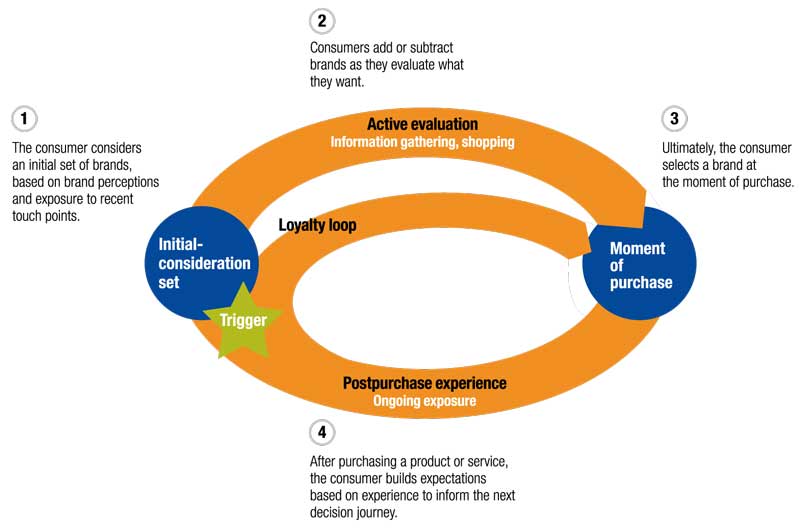I’ve had my share of dead-end marketing jobs. Things that looked great one year, go south the next. Sometimes, in spite of heroic marketing efforts, things just failed to take off. Or produced only substandard results in terms of business goals.
Then there are those times that I’ve stayed around longer than I should have; eventually, walking away from a ton of hard work with a shrug (and lessons learned). It made sense to start fresh in order to meet personal goal deadlines attached to my career management efforts.
Marketing success is dependent on broader organizational competencies
What I’ve discovered, like most other digital marketing veterans, is that marketing fueled business success is dependent on more than just exceptional marketing prowess.
Without strong business foundations, marketing success is short-lived.
Let’s consider just a marketing department to start with; A strong marketing foundation allows an organization to focus time and money on short-term campaigns that can produce results. For example, if there are a good number of white papers, blog posts and online calculators already living on the website, it will be easier to generate leads by scaling up select paid search campaigns.
However if the foundation is weak, resources need to be spent on shoring up these foundations before scalable results can be expected.
Similarly, broader core business competencies play a major role in sustainable marketing success, especially as a business moves from start-up to scale-up phase.
Any business leader expecting marketing innovation and excellence needs to consider:
1. Marketing Competencies:
This one is obvious since we are talking about marketing. The organization’s marketing competencies have to include strategy, optimization of channel integration, and tactical execution.
External and internal communications have to be a core strength of the marketing team. Consistency in brand positioning across channels is important to build brand preference and loyalty. Traditional marketing teams are usually strong in this area.
In addition, a modern marketing team is digitally astute. A blog post post has a longer shelf life than a print flyer in terms of reach, cross channel advantages (like organic and social media versatility) as well as the accessibility expectations of the modern customer.
In fact, software development mindsets are highly valued in a modern marketing center of excellence. This does not mean that a marketer should also be a programmer (though it helps). However, organizational competencies in marketing should include the ability to conceive and execute software development projects.
If you think about it, any website includes forms, interactive content, download mechanisms, online calculators, etc. And these customer facing elements are plugged into an invisible (to the customer) layer of analytics, CRMs, workflows, automation, tag management software, databases, and a variety of technology integrations.
“Marketing, in particular, has become heavily dependent on digital channels and touchpoints to reach and engage customers – in both consumer and business-to-business markets. As a result, you are affected by digital dynamics, regardless of your industry size or location” – Scott Brinker in Hacking Marketing.
Recently, I decided to create an online version of a first of its kind ROI calculator for maintenance planning and scheduling, originally conceived by our Director of Sales. The development process included hiring an agile development team to quickly (less than a month) put together a minimum viable version of the calculator.
This is an example of how software development competencies within marketing, can leverage years of external subject matter expertise to add value to the customer experience, as well as help in lead generation and niche thought leadership positioning.
2. Sales Team Competencies:
Is the sales team and leadership capable of dealing with the leads coming from marketing? Effective high performing sales teams use technology to optimize the sales cycle. If the sales team is not comfortable or resistant to leveraging marketing automation to improve performance and processes, the organization may under-perform in spite of a high performing marketing team. Quality leads should not fall through the cracks due to a faulty follow-up process.
A traditional sales team is inherently biased to sales methodologies and processes that have worked in the past and may not immediately see the value of online lead generation. The lack of processes to filter and follow-up on leads from online sources will ultimately result in lower conversions from these online channels. Thus reinforcing the bias for traditional methods. Sometimes, until it is too late and the competition is well ahead.
Sales and marketing alignment is crucial to maximize positive lead flow, conversions, and revenue. The mutual commitment to improving the feedback loop between sales and marketing is vital to achieving scale-able business goals.
3. Product/Service Competencies:
The product or service should be able to consistently deliver and exceed on the promise made by sales and marketing. As customers leverage social media as part of their increasingly digital lifestyles, any weakness in product or service value perceptions can spread quickly to undermine the best performing sales and marketing teams.
4. Operational Competencies:
If the sales team and marketing teams are in sync and closing deals at a high rate, client services and customer support should anticipate and adapt to the increase in business activity in their own areas. Delivery and response timelines are vital to customer satisfaction and product perception.
5. R&D and Innovation Competencies:
Can the product team continuously innovate and improve on the product based on customer feedback? A good product team can also predict what the customers are likely to want in the future. Hence the R&D chops of an organization are vital to customer acquisition and retention goals shared by the marketing and sales teams.
6. Leadership Vision Competencies:
Is the business leadership proactive enough to catch any mis-alignment between sales and marketing? The leadership should focus the team on the right KPIs that help distracted teams sync up.
Are business leaders willing to tolerate some amount of risk in marketing experimentation and channels?
Is the leadership encouraging a culture of positivity, excellent service, and high-performance? People like working with peers who help them achieve more.
It is easy for an executive team, especially those in a scale-up phase, to be lost in the operational weeds from time to time. It is important for this team to focus on longer-term scalable processes and objectives.
It goes without saying that the marketing strategy supports the leadership teams’ vision for growth and vice-versa. The lack of executive buy-in can undermine the best of marketing strategies.
In other words, the circular customer journey, so well described in this illustration from Mckinsey, has to be supported by the 6 competencies described above.
Holistic business competencies define success
The inter-dependencies of business units is only one factor that makes it unlikely that a digital marketing strategy that works for one company will work for another. Rapidly evolving business dynamics may force a company to rethink a currently ineffective strategy that worked perfectly well just a year ago.
Apart from adapting to the constantly evolving business landscape, marketing goals have to meet the expectations of executive stakeholders. The CEO, or anyone writing out the cheques for a marketing budget expects accountability and ROI for the spend.
If you are leading marketing efforts, the clarity you derive from a holistic assessment of business units will help you manage executive expectations from marketing investments.
Hopefully, you will work with the executive branch to derive best value from this investment by strengthening interdependent business competencies.
As I look back on past ‘failures’ (learning opportunities), I notice that my marketing efforts were not always supported by competencies in other business units. Don’t get me wrong, I’m not blame shifting. At times, I played a pivotal part in those ‘other business units’ in an entrepreneurial capacity. Obviously, I had learning to do.
What it comes down to – sustainable marketing success is a team sport. Teams that scale with this mindset have a better shot at tackling the challenges posed by the rapidly accelerating paradigm shifts in business.

